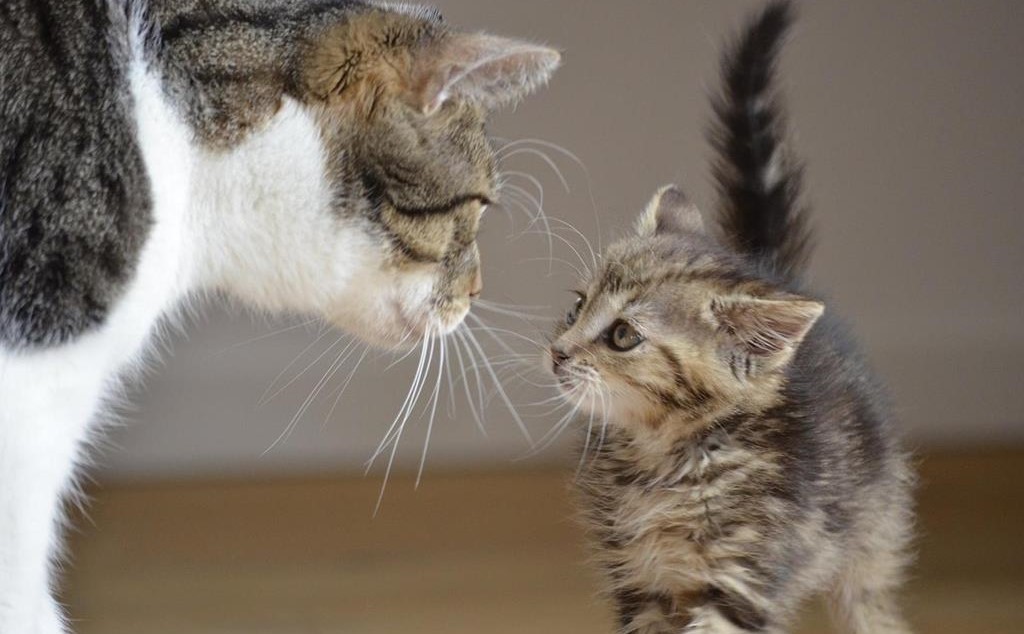Taking care of a kitten without a mother might seem like a daunting task, but with love, patience, and proper care, you can ensure that the little furball grows up happy and healthy. Although it is best for kittens to be nurtured by their mothers, circumstances may arise where a kitten is orphaned or abandoned. Here are some essential tips on how to take care of a kitten without a mother:
Tips on how to take care of a kitten without a mother
1. Create a warm and safe environment:
Newborn kittens cannot regulate their body temperature, so it’s crucial to provide them with a warm living area. Use a heating pad or a hot water bottle wrapped in a towel to create a cozy spot for the kitten. Ensure the temperature is between 85-90°F (29-32°C) initially and then gradually reduce it as they grow.
2. Establish a feeding routine:
If the kitten is under four weeks old, it will require bottle-feeding with a kitten-specific milk replacement formula, available at pet stores or from a veterinarian. Use a small, soft nipple and hold the bottle at a slight angle to mimic nursing. Feed the kitten every two to four hours, day and night.
3. Stimulate elimination:
Kittens, just like their mother, need help with elimination. After every feeding, use a soft, warm, damp cloth or cotton ball to gently stimulate the area around their genitals and anus. This mimics the action of the mother cat licking her kittens to prompt them to pee and poop. Be patient and gentle, as it may take a few tries for them to eliminate.
4. Provide a litter tray:
When the kitten is around three to four weeks old, introduce a shallow litter tray with non-clumping litter. Place the kitten in the tray after meals and gently guide them to scratch the litter with their paws. This helps them learn how to use the litter box.
5. Socialize and promote bonding:
Kittens need plenty of social interaction and affection to thrive. Spend quality time with them, gently petting and cuddling them to help build trust and create a strong bond. Encourage playtime with appropriate toys such as feather wands or small balls to stimulate their natural instincts.
6. Regular veterinary check-ups:
Schedule a veterinary appointment as soon as possible to ensure the kitten is healthy and to establish a care plan. The vet will guide you on vaccinations, deworming, flea prevention, and other necessary health checks to keep the kitten in optimal condition.
7. Gradually introduce solid food:
Between three to four weeks, the kitten can start transitioning to solid food. Begin by offering a mix of wet kitten food and kitten formula, gradually reducing the formula over time. Make sure the food is specifically formulated for kittens, as their nutritional needs differ from adult cats. Monitor the kitten’s progress and adjust the feeding schedule accordingly.
8. Provide a safe and stimulating environment:
Create a safe space for the kitten to explore, including a cozy bed or blanket, a scratching post, and interactive toys. Ensure the area is free from hazards such as toxic plants, chemicals, and small objects they could swallow.
9. Monitor their growth and development:
Regularly weigh the kitten to ensure they are gaining weight properly. Keep an eye on their eyes, ears, teeth, and fur, looking out for any abnormalities or signs of illness. If you notice anything concerning, consult a veterinarian promptly.
10. Consult with a professional or foster network:
If you feel overwhelmed or need more guidance, consider reaching out to a professional, such as a veterinarian or a local animal shelter. They can provide additional advice and might even be able to connect you with a foster network or experienced caretakers who can assist you in caring for the kitten.

Can a kitten survive without its mother?
From the moment they are born, kittens rely on their mother for warmth, nourishment, and protection. However, there may be circumstances where a kitten is separated from its mother. Whether orphaned or abandoned, this vulnerable phase in a kitten’s life requires special care to ensure its survival and well-being. So, can a kitten survive without its mother?
The short answer is yes, with proper care and attention, a kitten can survive without its mother. However, raising an abandoned kitten is a significant responsibility that requires time, effort, and knowledge. Here are some essential considerations and steps to follow when taking care of a kitten without its mother:
1. Provide a warm and safe environment:
Newborn kittens cannot regulate their body temperature, so it’s crucial to create a warm and cozy living space for them. Use heating pads or hot water bottles and place them under blankets or towels to mimic the warmth provided by a mother.
2. Ensure proper nutrition:
Kittens need specific nutrients and antibodies found in their mother’s milk during the early weeks of their lives. If the mother cat is absent, it is necessary to provide them with a suitable milk replacer formula designed for kittens. Feeding should be frequent, starting with every two to three hours and gradually reducing over time.
3. Help with elimination:
Mother cats stimulate their kittens’ elimination by licking their genital area. As a caretaker, you can mimic this action by using a warm, damp cloth or cotton ball to gently stimulate the kittens’ anal and genital area after each feeding. This encourages them to urinate and defecate.
4. Socialize and provide companionship:
Kittens require social interaction and companionship to develop properly. Spend time with the kitten, providing gentle petting and cuddling to promote bonding and trust. Engage them in interactive play with appropriate toys to encourage their natural instincts and facilitate their physical and mental development.
5. Introduce solid food gradually:
Around three to four weeks of age, kittens can start transitioning to solid food. Offer a high-quality, wet kitten food mixed with milk replacer, gradually reducing the amount of replacer over time. Monitor their progress and adjust the feeding routine accordingly.
6. Monitor health and schedule veterinary check-ups:
Regular veterinary check-ups are crucial to ensure the kitten’s health. A veterinarian will provide vaccinations, deworming treatments, and guidance on feeding, growth, and any other necessary care. They will also address any concerns or health issues that may arise.
7. Seek professional assistance if needed:
Caring for a kitten without its mother can be challenging, especially for those without prior experience. If you feel overwhelmed or need guidance, don’t hesitate to consult a veterinarian, local animal shelter, or experienced caretakers. They can provide valuable advice and support to ensure the best possible care for the kitten.
While it is possible for a kitten to survive without its mother, it’s important to recognize the significant responsibility it entails. Providing the essential care, nutrition, and socialization will help the kitten thrive and develop into a healthy and happy cat. Remember, consulting with professionals is always recommended to ensure optimal care for the kitten’s specific needs.
FAQ:
1. How do I keep a newborn kitten warm without its mother?
To keep a newborn kitten warm, you can use a heating pad set to a low temperature or a hot water bottle wrapped in a towel. Place the source of warmth near the kitten’s bed, ensuring it is not too hot or close to the kitten.
2. What do I feed a kitten if it doesn’t have a mother?
If the kitten is under four weeks old and does not have a mother, you will need to bottle-feed them with a kitten-specific milk replacement formula. You can find this formula at pet stores or consult with a veterinarian for recommendations.
3. How often should I feed a kitten without a mother?
Newborn kittens need to be fed every two to four hours, both day and night. As they grow, the frequency of feeding can be reduced gradually. Consult with a veterinarian to create a feeding schedule suitable for the kitten’s age and needs.
4. How do I help a kitten go to the bathroom without its mother?
To help a kitten go to the bathroom, mimic the mother cat’s actions by using a soft, warm, damp cloth or cotton ball to gently stimulate the area around their genitals and anus after each feeding. This encourages them to urinate and defecate.
5. Can I leave a kitten alone if it doesn’t have a mother?
Newborn kittens require constant care and attention, even more so without a mother. It is not advisable to leave them alone for extended periods. If necessary, make sure there is someone available to care for the kitten in your absence, or consider reaching out to a local animal shelter or foster network for assistance.
Conclusion:
Remember, being a surrogate parent to a kitten requires time, attention, and dedication. This can be a challenging but ultimately rewarding experience. With the right knowledge and dedication, you can provide the love and care needed to help the kitten thrive. The tips and guidelines mentioned above will serve as a helpful starting point in your journey as a surrogate parent for the kitten.
Keep in mind that each situation may vary, and it is always recommended to consult with a veterinarian for personalized advice based on the specific needs of the kitten. Cherish the opportunity to provide a nurturing environment and watch the orphaned kitten grow into a happy and healthy cat.



